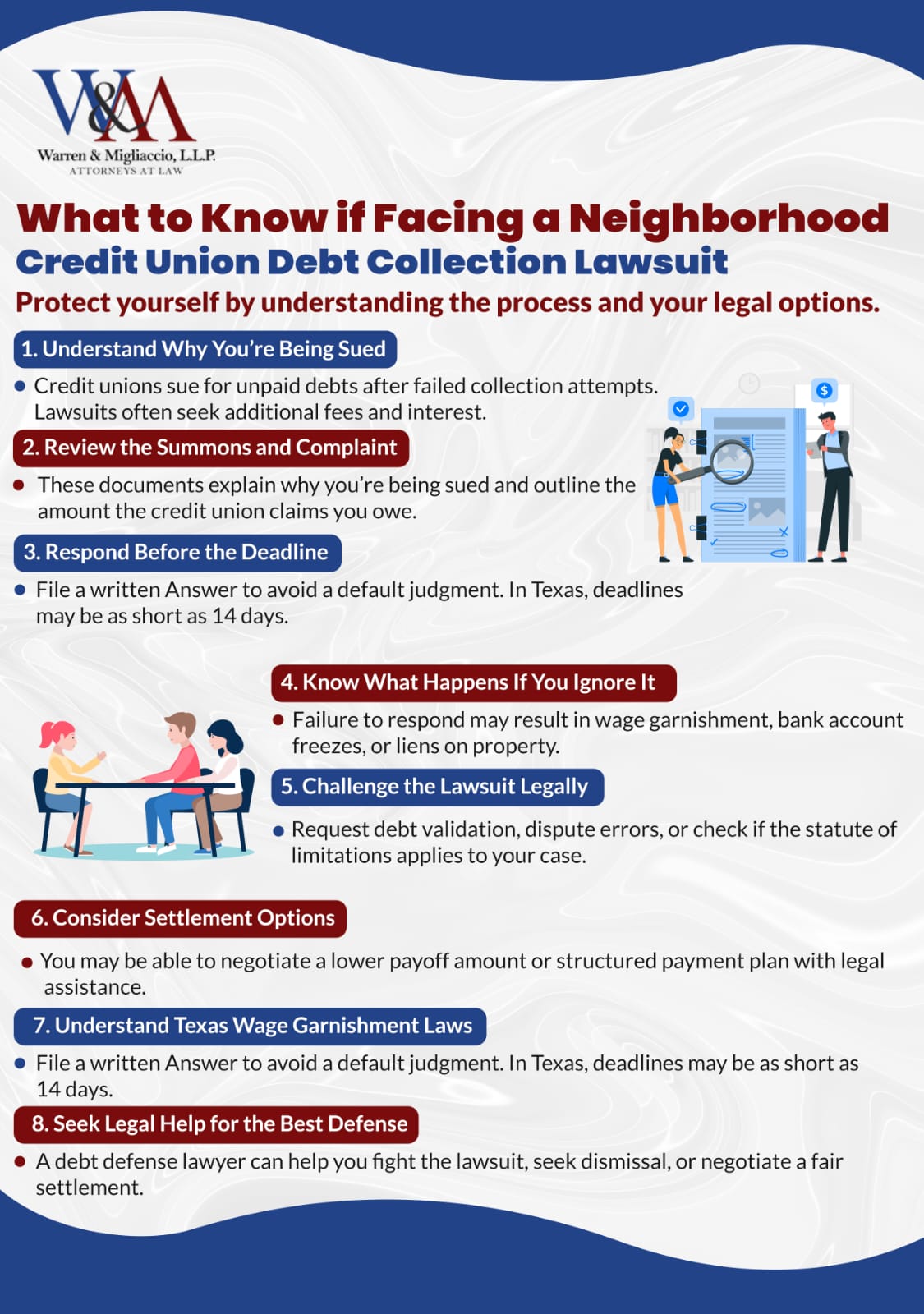Has your credit union, Neighborhood Credit Union, sued you for an alleged debt? If so, you may be feeling anxious and unsure about how to protect your interests and resolve the lawsuit. Below, our Texas debt collection defense lawyers discuss what you should know if facing a Neighborhood Credit Union debt collection lawsuit.
What Is Neighborhood Credit Union?
Neighborhood Credit Union is the first credit union founded in the Dallas-Fort Worth Metroplex. According to its website, the credit union was established in April 1930 as the Dallas Postal Employees Credit Union. In 2001, it updated its name to Neighborhood Credit Union. Now, it has 62,000 members across Texas. Living in Texas is the only requirement for being a member of Neighborhood Credit Union.
A credit union differs from a traditional bank in that it is a not-for-profit owned by its members rather than a for-profit business that benefits its shareholders. A credit union’s earnings return to its members through improved rates and lower fees.
According to its website, Neighborhood Credit Union is a fully digital credit union. However, it has branch locations across the DFW Metroplex. The credit union offers services similar to those of traditional banks. Beyond checking and savings account options, it provides members with various lending options. For example, its options include:
- Credit cards
- Personal loans
- Auto loans
- Home loans
Why Would a Credit Union Sue You?
A credit union may sue a member who has defaulted on a credit card or loan. However, credit unions typically try to collect debt through emails, letters, and phone calls first. Then, if those collection efforts are unsuccessful, they may resort to legal action.
Neighborhood Credit Union usually turns its defaulted accounts over to a debt collection law firm to handle collection efforts and litigation. The law firm it uses, Blalack & Williams, has represented credit unions and other creditors in debt collection lawsuits since 1975.
If Neighborhood Credit Union decides to file a lawsuit, it will likely pursue more than the original debt. It will also likely seek accrued interest, late fees, court costs, and attorney’s fees, which can significantly increase the total amount you owe if it gets a judgment against you.
What Happens if Sued by Neighborhood Credit Union for Debt Collection?
If Neighborhood Credit Union sues you for debt, you should get served with the lawsuit. The lawsuit papers you receive will include the following:
- Complaint. The complaint will tell you why Neighborhood Credit Union is suing you. It will discuss each of the credit union’s claims against you and provide details about the alleged debt. The complaint will also break down what the credit union is requesting from the court as relief.
- Summons. The summons is the official notice of the lawsuit from the court. It will tell you which court is handling the case and the case number assigned to your case. It will also provide information about responding to the lawsuit, which is called an Answer, your deadline to respond, and the consequences of not filing an Answer.
If you fail to respond by the deadline, the court may issue a default judgment against you. A default judgment means you automatically lose the case because you did not file an Answer or appear in court. Depending on the court overseeing the case, you may have as little as 14 days to file your Answer with the court.
With a judgment against you, the credit union can take further action to collect the debt. For example, it may pursue the following:
- Freezing and garnishing your bank accounts
- Placing a lien on your property
- Seizing nonexempt property
In Texas, Neighborhood Credit Union cannot pursue wage garnishment. The state prohibits wage garnishment for most consumer debts like credit card debt. However, once your paycheck is deposited into your bank account, that money may be seized through bank garnishment.
Because of these severe potential consequences, we recommend consulting an experienced Texas debt collection defense lawyer if you are being sued. Our law firm provides a free consultation to help you understand your situation and options for resolving the lawsuit.
How Warren & Migliaccio Can Help You if Facing a Texas Debt Collection Lawsuit
At Warren & Migliaccio, we represent and defend Texans facing debt collection lawsuits from creditors like Neighborhood Credit Union. We have gone up against the country’s largest creditors and debt collectors to help individuals reach favorable resolutions in debt collection cases.
Is Neighborhood Credit Union suing you for debt? If so, our Texas debt defense lawyers can help you navigate the entire process, from a free consultation to help you understand your situation through case resolution. More specifically, we provide a free consultation to review the claims against you and help you understand your potential legal options for resolving the lawsuit. Then, if you choose to work with us, a few ways we can help you include:
- Avoiding a default judgment by preparing and filing an Answer with the court
- Requesting debt validation from Neighborhood Credit Union
- Investigating the claims against you
- Identifying any weaknesses in Neighborhood Credit Union’s case
- Seeking a case dismissal, if possible
- Helping you understand your legal options so you can make an informed decision about your case
- Executing the best course of action for your case to help you reach a favorable resolution
Keep in mind that the best course of action for your case will depend on your unique financial situation and the strength of the case against you. Our team will always seek a case dismissal if possible. However, if a case dismissal is not possible, your options generally include fighting the case in court or negotiating a settlement. Seeking bankruptcy may also be a viable option if your debt beyond the lawsuit is too overwhelming.

FAQs: Neighborhood Credit Union Debt Collection in Texas
Filing a Lawsuit for Unpaid Debt
▶
▼
Can Neighborhood Credit Union sue me for unpaid debt?
Yes, Neighborhood Credit Union can file a lawsuit if you default on a loan, credit card, or other financial product. They usually attempt collection through phone calls, letters, and emails before suing.
- If sued, you will receive a summons and complaint.
- Failing to respond in time may result in a default judgment.
- Default judgments allow the credit union to pursue collection actions, including liens or bank account freezes.
▶
▼
How do I respond to a summons from Neighborhood Credit Union?
Responding promptly is crucial. You must file a written Answer before the deadline in the summons, often as little as 14 days.
- Your Answer formally disputes or acknowledges the claim.
- Include any legal defenses or objections.
- Send a copy of your Answer to Neighborhood Credit Union or its attorneys.
- Early response prevents default judgment and preserves your legal rights.
▶
▼
What happens if I ignore a Neighborhood Credit Union debt collection lawsuit?
Ignoring the lawsuit usually leads to a default judgment in favor of the credit union.
- Allows the creditor to freeze bank accounts or place property liens.
- Fees, interest, and legal costs may accumulate rapidly.
- Early legal intervention can prevent default and allow defenses.
- Ignoring the lawsuit does not eliminate the debt and worsens consequences.
Defending Against Debt Collection Lawsuits
▶
▼
How can I fight a Neighborhood Credit Union debt collection lawsuit in Texas?
You can challenge the lawsuit by filing an Answer, demanding proof of the alleged debt, or negotiating a settlement.
- Legal defenses may include improper service or the statute of limitations.
- Carefully review all documentation for errors or inaccuracies.
- Spotting mistakes can strengthen your defense and may lead to dismissal.
- Settlement negotiations can reduce the amount owed or avoid court entirely.
▶
▼
Does Texas law protect me from wage garnishment by Neighborhood Credit Union?
Yes. Texas law generally prohibits wage garnishment for most consumer debts, including credit cards and personal loans.
- Creditors can still attempt to freeze funds after deposit.
- Exceptions include taxes, student loans, or child support obligations.
- A judgment can allow liens on property or seizure of nonexempt assets.
- Understanding exemptions and protections can help you safeguard income and property.
Schedule a Free Consultation With Our Texas Debt Defense Lawyers
Is Neighborhood Credit Union suing you for alleged debt? If so, do not hesitate to reach out to us about your situation. We represent individuals and families facing debt collection lawsuits statewide. We also provide a free consultation with no obligation to you.
During this consultation, we can review the claims against you, answer your legal questions, and help you understand your potential legal options for resolving the lawsuit. Call us at (888) 584-9614 or contact us online to schedule your consultation.

